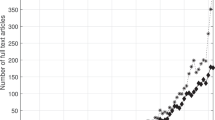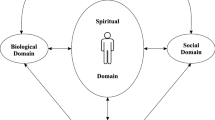Abstract
This study assessed the perceptions and practices of a national sample of university counseling professionals (n = 306) regarding their provision of guidance on the health effects of religious/spiritual involvement. Relatively few (21%) discussed the physical health effects of religiosity/spirituality with their clients. The majority (52%) were unsure that such discussions would result in lower health risks; however, nearly half (48%) indicated that these would promote recovery. Almost two-thirds (64%) indicated that discussions of religious/spiritual involvement and health “should occur only with clients who indicate that religion/spirituality is important to them.” A plurality (36%) of the respondents had received no formal training on this topic. Implications for clinical training, university counseling centers, and future research are discussed.
Similar content being viewed by others
Notes
Religion and spirituality reflect the “feelings, thoughts, experiences, and behaviors that arise from a search for the sacred” (Larson et al. 1998, p. 21). Although the terms are presented jointly in this manuscript to ensure that terminology is not used in an overly restrictive manner, religion and spirituality are conceptually distinct. Therefore, the constructs will be measured separately in this study as recommended in the literature (Fetzer/NIA 2003; Hill and Pargament 2003). “Religious/spiritual involvement” entails variables such as religious service attendance, prayer, meditation, religious coping, the provision and receipt of social support in a religious/spiritual context, and attitudes of compassion, forgiveness, gratitude, hope, optimism, etc.
References
American Psychological Association. (2000). Guidelines and principles of accreditation for programs in professional psychology. Retrieved September 13, 2009 from www.apa.org/ed/doctoral.html.
Astin, H. (2003). Spirituality in higher education. Retrieved July 22, 2009 from http://spirituality.ucla.edu.
Bandura, A. (1997). Self-efficacy: The exercise of control. New York: W.H. Freeman.
Benton, S. A., Benton, S. L., Newton, F. B., Benton, K. L., & Robertson, J. M. (2004). Changes in client problems. Professional Psychology: Research & Practice, 35, 317–319.
Chatters, L. M., Levin, J. S., & Ellison, C. J. (1998). Public health and health education in faith communities. Health Education and Behavior, 25, 689–699.
Curlin, F. A., Chin, M. H., Sellergren, S. A., Roach, C. J., & Lantos, J. D. (2006). The association of physicians’ religious characteristics with their attitudes and self-reported behaviors regarding religion and spirituality in the clinical encounter. Medical Care, 44, 446–453.
Curlin, F. A., Odell, S. V., Lawrence, R. E., Chin, M. H., Lantos, J. D., Meador, K. G., et al. (2007). Psychiatry and religion among US physicians. Psychiatric Services, 58, 1193–1198.
Fetzer Institute National Institute on Aging Work Group. (2003). Multidimensional measurement of religiousness/spirituality for use in health research. Kalamazoo, MI: Fetzer Institute.
Francis, L. J., Robbins, M., Lewis, C. A., Quigley, C. F., & Wheeler, C. (2004). Religiosity and general health among undergraduate students. Personality and Individual Differences, 37, 485–494.
Gallagher, R. P., Zhang, B., & Taylor, R. (2003). National survey of counseling directors, 2003. Alexandria, VA: International Association of Counseling Center Directors.
Glasgow, R. E., Emont, S., & Miller, D. C. (2006). Assessing delivery of the five “A’s” for patient-centered counseling. Health Promotion International, 21, 245–255.
Grabovac, A. D., & Ganesan, S. (2003). Spirituality and religion in Canadian psychiatric residency training. Canadian Journal of Psychiatry, 48, 171–175.
Harrison, J. A., Mullen, P. D., & Green, L. W. (1992). A meta-analysis of studies of the health belief model with adults. Health Education Research, 7, 107–116.
Hill, P. C., & Pargament, K. I. (2003). Advances in the conceptualization and measurement of religion and spirituality. American Psychologist, 58, 64–74.
Hyun, J. K., Quinn, B. C., Madon, T., & Lustig, S. (2006). Student mental health: Needs assessment and utilization of counseling services. Journal of College Student Development, 47, 247–266.
Johnson, C. V., & Hayes, J. A. (2003). Troubled spirits: Prevalence and predictors of religious and spiritual concerns among university students and counseling center clients. Journal of Counseling Psychology, 50, 409–419.
Kellems, I. S. (2005). A survey of university counseling center therapists: Working with clients who have religious/spiritual issues. Dissertation Abstracts International, 66, 4485 (UMI No. 3184293).
King, K. A., Pealer, L. N., & Bernard, A. L. (2001). Increasing response rates to postal questionnaires: A review of inducement strategies. American Journal of Health Education, 32, 4–15.
Koenig, H. G. (2005). Faith and mental health. Philadelphia: Templeton Foundation Press.
Koenig, H. G. (2007). Spirituality in patient care. Philadelphia: Templeton Foundation Press.
Koenig, H. G., McCullough, M. E., & Larson, D. B. (2001). Handbook of religion and health. New York: Oxford University Press.
Larimore, W. L., Parker, M., & Crowther, M. (2002). Should clinicians incorporate positive spirituality into their practices? Annals of Behavioral Medicine, 24, 63–69.
Larson, D. B., Swyers, J. P., & McCullough, M. E. (Eds.). (1998). Scientific research on spirituality and health: A consensus report. Rockville, MD: National Institute for Health Care Research.
Lichwala-Zyla, C. E., Price, J. H., Dake, J. A., Jordan, T. J., & Price, J. A. (2009). Psychiatrists’ perceptions and practices in treating patients’ obesity. Academic Psychiatry (in press).
McHorney, C. A., Ware, J. E., & Raczek, A. E. (1993). The MOS 36-item short-form health survey. Medical Care, 31, 247–263.
Mowbray, C. T., Megivern, D., Mandiberg, J. M., Strauss, S., Stein, C. H., Collins, K., et al. (2006). Campus mental health services. American Journal of Orthopsychiatry, 76, 226–237.
Nagel, E., & Sgoutas, S. (2007). The relationship between spirituality, health beliefs, and health behaviors in college students. Journal of Religion and Health, 46, 141–154.
National Center for Education Statistics. (2008). The integrated post-secondary education data system (IPEDS). Retrieved December 8, 2008 from http://nces.ed.gov/ipeds/.
Neff, J. A. (2006). Exploring the dimensionality of “religiosity” and “spirituality” in the Fetzer multidimensional measure. Journal for the Scientific Study of Religion, 45, 449–459.
Nelms, L. W., Hutchins, E., Hutchins, D., & Pursley, R. J. (2007). Spirituality and the health of college students. Journal of Religion and Health, 46, 249–265.
Plante, T. G., & Sherman, A. C. (Eds.). (2001). Faith and health. New York: Guilford Press.
Price, J. H., Dake, J. A., Murnan, J., Dimmig, J., & Akpanudo, S. (2005). Power analysis in survey research. American Journal of Health Education, 34, 202–207.
Price, J. H., Mrdjenovich, A. J., Thompson, A., & Dake, J. A. (2009). College counselors’ perceptions and practices regarding anticipatory guidance on firearms. Journal of American College Health (in press).
Prochaska, J. O., Redding, C. A., & Evers, K. E. (2002). The transtheoretical model and stages of change. In K. Glanz, B. K. Rimer, & F. M. Lewis (Eds.), Health behavior, health education: Theory research, practice (3rd ed.). San Francisco: Jossey Bass.
Puchalski, C. M., Larson, D. B., & Lu, G. G. (2001). Spirituality in psychiatry residency training programs. International Review of Psychiatry, 13, 131–138.
Robbins, W. M. (2001). Spirituality awareness and education: A needs assessment for clinical psychology doctoral programs. Dissertation Abstracts International, 63, 4384 (UMI No. 3065512).
Rose, E. M., Westefeld, J. S., & Ansely, T. A. (2001). Spiritual issues in counseling: Clients’ beliefs and preferences. Journal of Counseling Psychology, 40, 61–71.
Schwitzer, A. M., & Choate, H. (2007). College student needs and counseling responses. Journal of College Counseling, 10, 3–5.
Shafranske, E. P. (2001). The religious dimension of patient care within rehabilitation medicine. In T. G. Plante & A. C. Sherman (Eds.), Faith and health. New York: Guilford Press.
Sloan, R. P., Bagiella, E., VandeCreek, L., Hover, M., & Casalone, C. (2000). Should physicians prescribe religious activities? New England Journal of Medicine, 342, 1913–1916.
Stone, G. L., Vespia, K. M., & Kanz, J. E. (2000). How good is mental health care on college campuses? Journal of Counseling Psychology, 47, 498–510.
Sue, D. W., Arredondo, P., & McDavis, R. J. (1992). Multicultural counseling competencies and standards: A call to the profession. Journal of Counseling and Development, 20, 477–486.
Author information
Authors and Affiliations
Corresponding author
Rights and permissions
About this article
Cite this article
Mrdjenovich, A.J., Dake, J.A., Price, J.H. et al. Providing Guidance on the Health Effects of Religious/Spiritual Involvement: A National Assessment of University Counseling Professionals. J Relig Health 51, 198–214 (2012). https://doi.org/10.1007/s10943-010-9345-8
Published:
Issue Date:
DOI: https://doi.org/10.1007/s10943-010-9345-8




